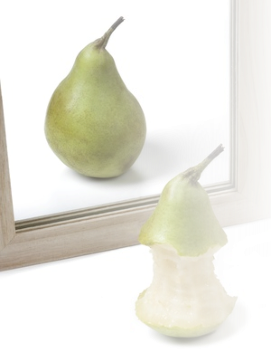Reflektion En sida full av tankar, helt enkelt
Innovationsvinnare
“SOLAR FOOD”
In countries near the equator there are a lot of fruit produced due to the good climate. At the same time a lot of this
fruit rottens in the warm and humid air. Solar food addresses this problem by constructing a solar from very cheap
materials that are available all over the world. Coke cans, some plywood a bit of plexiglass, a simple net and some
kind of isolation. The solar food group has shown in tests at Lund University that the sun can dry fruit in this solar in
just a few hours and in that way conserve food that can be stored and used instead of just be thrown away as waste.
PL(d)ASTICS
In modern farming countries a lot of silage plastics are used to store hay. This petroleum based plastic are supposed
to be collected at special waste stations and disposed properly. But many farmers don´t want that cost and burn it or
just digs it down somewhere. PL(d)Astics solves this problem by introducing a new plastic that is based upon
renewable sources as corn or waste from households. By introducing this plastic CO2-emissions as well as emissions of
toxins and other poisonous gases are decreased to a minimum. Discussions with a bio plastic company has been
initiated and they support the idea.
“POW - Plastic Ocean Waste”
The oceans are flooding with plastic waste and we all know that this is influencing the ocean environment as well as
humans by all the microplastics that are released. POW wants to address this problem by using the huge plastic
islands that are formed by sea currents (e.g. outside the coast of Canada). POW suggests that a floating LNG
(Liquified Natural Gas)-factory are placed next to these plastic islands. By a procedure where the plastics are
harvested and turned into natural gas (methane) this huge problem can be fixed at the same time as fuel are made
which can be sold and then collected by LNG-ships that are already trafficking the oceans.
“SAVE THE FOOD”
Out of all the food produced worldwide, one third of it is wasted. At the same time, 1 out of 9 people in the world go
to bed hungry every night. To produce the food that is wasted, approximately 1.9 ton of carbon dioxide is released
into the atmosphere every year. That is the same as the release from 700 000 cars. Our solution to these problems is a
network of food banks in Skåne.
Our concept of foodbanks will pick up leftover food from donors such as farmers and supermarkets, store them in the
foodbanks and deliver them to charity organisations that will serve it to the hungry people in Skåne. The charity
organisations and the foodbanks need to communicate. We will create a website that shows all the food available that
charity organisations can easily order from.
Foodbanks have to meet the same food safety standards as all other food businesses, for example the unbroken cold
chain, which we will implement a system in order to maintain.
Our innovation is connected to Skånes development strategy for 2030 in several differnt ways. Skåne wants to
increase cohesion and contact between the different cities, and therefore the foodbanks will be strategically located
in Skånes key cities: Malmö, Kristianstad and Helsingborg, as well as Ystad, in order increase cooperation between
them.
According to Skånes development strategy, Skåne has the lowest employment rate in all of Sweden, and this was even
written before the almost 7000 refugees that arrived in 2015. The network of foodbanks would create many different
employment opportunities for people with both high and low levels of education, and for people who have recently
arrived to Sweden.
Half of all the food produced in Sweden, is produced in Skåne. The network of food banks would take advantage of
this and Skåne would become a rolemodel for entrepreneurship and sustainability, which is also one of their goals in
the development strategy for 2030.











